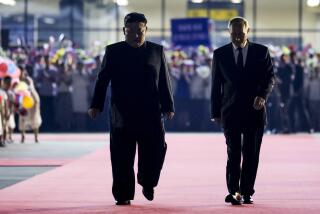PERSPECTIVE ON NORTH KOREA : The Nuclear Card Is Back in Play : Kim Jong Il’s survival depends on it, so hopes wane for winning compliance with carrots instead of sticks.
- Share via
Even in death, Kim Il Sung has reshuffled the deck one final time in the high-stakes drama unfolding among Washington, Seoul and Pyongyang. The delay in the U.S.-North Korean negotiations in Geneva and the indefinite postponement of the first-ever North-South summit once again frustrate international efforts to stymie and reverse Pyongyang’s worrisome nuclear activities, buying the embattled North Korean regime additional time for weapons development. Kim would undoubtedly have enjoyed the irony.
The initial impulse of the Clinton Administration has been to remain as conciliatory as possible toward North Korea. In public comments following Kim Il Sung’s death, President Clinton and Secretary of State Warren Christopher have sought to keep avenues open to the successor leadership in Pyongyang. The Administration clearly has no desire to upset the elaborately choreographed bilateral discussions in Geneva.
South Korean responses have been decidedly different. Although President Kim Young Sam voiced token disappointment that the scheduled summit is off, the South Koreans are actually in no hurry to resume the dialogue. Seoul was originally prepared to accept inherently disadvantageous summit terms for one overriding reason--a meeting with Kim Il Sung would have conferred legitimacy and stature on the South Korean government in the eyes of its long-term enemies in Pyongyang. The passing of the legendary old leader removes all such incentives. Rather than bestow legitimacy on the south, a summit now would principally benefit Kim Jong Il.
Although initial indications seem to point to a smooth succession, these signs are illusory. The South Koreans are well aware that Kim Jong Il is reclusive, untested, quite possibly unstable and very likely resented by his father’s senior compatriots, including his politically powerful stepmother, Kim Song Ae. As a result, President Kim Young Sam has little to gain and much to lose in immediate talks with a leader whose hold on power may be tenuous. That the younger Kim’s hand is so weak helps explain why North Korea took the initiative in postponing the summit.
Moreover, the South Koreans believe that Kim Jong Il is no conciliator. Since March, 1993, when Pyongyang announced its intention to withdraw from the Nuclear Non-Proliferation Treaty, North Korean propaganda has repeatedly identified the younger Kim as the architect of this policy. Now he is likely to view determined pursuit of the nuclear weapons program as integral to his efforts to consolidate his power. And he’s probably right. The younger Kim’s survival is likely to depend on the skill with which he handles the next stages of the nuclear crisis.
As leaders in Pyongyang mourn, the 8,000 fuel rods removed from the Yongbyon nuclear reactor in late spring continue to cool. North Korean spokesmen have already claimed that for reasons of safety (supposed deterioration of the aluminum cladding in which the fuel rods are encased) Pyongyang will need to remove some of the spent fuel from the cooling ponds by the end of August. This suggests that North Korea may be preparing to violate Kim Il Sung’s pledge to freeze the nuclear program in return for negotiations with the United States. If so, the Clinton Administration will soon face a vexing decision--whether to resume talks with North Korea or seek complimance with sticks rather than carrots.
Such a preemptive move by Pyongyang would be consistent with North Korean behavior under Kim Il Sung. With his father gone from the scene, there is little to suggest that the younger Kim will be prepared to barter away the one instrument of North Korean power that could keep the outside world and his internal rivals at bay.
More to Read
Sign up for Essential California
The most important California stories and recommendations in your inbox every morning.
You may occasionally receive promotional content from the Los Angeles Times.













